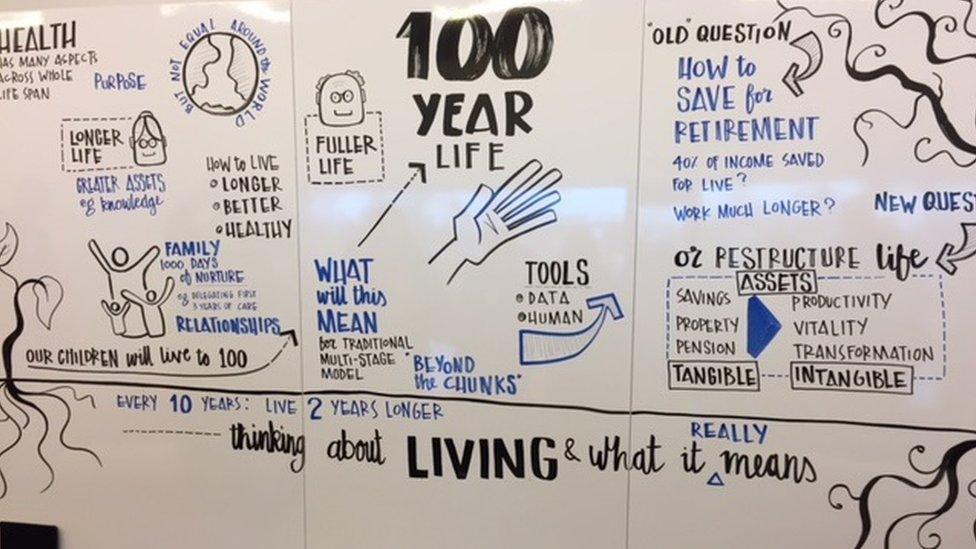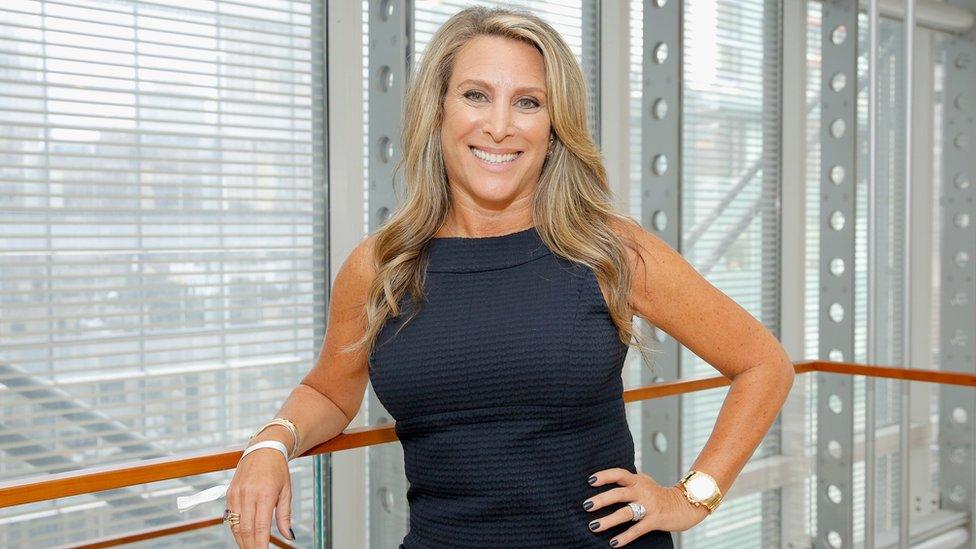Does living to 100 mean we'll work forever?
- Published

Living longer may also mean working longer
Will you live to be 100 years old? Even if you don't - it's pretty likely your children or your grandchildren will.
While Brexit, China and Trump may be dominating the news out of this year's World Economic Forum in Davos, living longer is a hot topic in the cold and snowy mountain village, and one which many attendees are already grappling with.
Current trends suggest, external most babies born since 2000 in developed countries such as the UK, US, Canada, France and Germany, will live past their 100th birthday.
Put another way, for every 10 years since the 19th Century, life expectancy has increased by two and a half years, according to Jim Vaupel from Max Planck Institute of Demography, who has tracked global changes over the past 150 years.
That's the equivalent of another six to eight hours every day.
The successful women embracing ‘girl power’
It may sound great - after all who doesn't want to live for as long as possible - but the reality is we may also be working for as long as possible to be able to pay for it.
"If we live 30 years longer, then in order to retire at 60 we would have to save five times as much during our working lives. It's the end of retirement as we know it," says Lynda Gratton, who hosted a session on the topic in Davos.
She is a psychologist, and professor of management practice at the London Business School, and has written a book on the topic.

The effects of people living longer is one of the hot topics in Davos
Rather than the three traditional stages of life: education, work and retirement, Ms Gratton expects people to have to constantly retrain as they shift careers and focus.
Counter-intuitively, she suggests that one positive of having a longer career could actually mean a better work-life balance.
If you're working for longer, then taking a couple of years out to look after children, or ageing parents for example, won't be such a big deal when your career lasts for 60-plus years, she suggests.
Jo Ann Jenkins, chief executive at non-profit group AARP - the influential lobby group for older Americans - says working longer is already a reality for many in the US.
In 2012, US employees aged over 50 made up almost a third of the workforce. By 2022 they're expected to make up 36%.
The shift has already forced the group to change its name. The body used to be called the American Association of Retired Persons, but had to change it to just AARP because its members complained they weren't retired, but still working.
"People used to think middle age started around 35. Now, most people think it's late 40s or early 50s. Same thing with one's working years. Someone who was 55 or 60 often used to be seen as over the hill. That's not the case today," says Ms Jenkins.

Longer life expectancy isn't always matched by good health
She believes one of the big adjustments will be how to manage the increasing breadth of age groups in the workplace.
"Years ago, one of the big questions was: can a man report to a woman manager? We've answered that question. Today, a big question is: can an older employee report to a younger manager? I think many organisations are still grappling with that."
Of course, increased life expectancy isn't always matched by better health.
New medicines
Christophe Weber, the chief executive of Japanese pharmaceutical giant Takeda, says the key issue is how long people are remaining well.
In Japan, around a quarter of the population is now over 60, and Mr Weber notes that this increasing longevity also means certain diseases such as dementia, for example, are on the rise.
He says research and finding new medicines to address the issue will be crucial.
"[People living longer] is a very nice evolution but the challenge is how you finance it," he says, adding that the healthier people are, the less costly it is.
Gap year?
As far as work goes, he says people need "a soft landing carrier to retirement", suggesting while older people may remain at work, they're likely to work part-time, or in less hands-on mentoring roles.
But if even the idea of working part-time when you're in your 70s seems depressing, Ms Gratton has some encouragement.
She says the fact that you're likely to have to change jobs and retrain several times to remain employable over 60 years offers a natural break to take time out.
"Take a gap year. Why should it only be the young who take gap years? You could take a gap year at 50, and travel around the world," she says.
- Published14 September 2016

- Published17 January 2017
